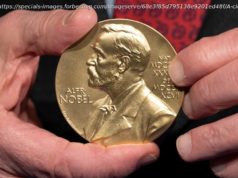After North Korea tested its first ICBM, President Trump signaled the willingness to seek other options to pressure China to control its ally.
President Trump expressed frustration Wednesday that China is not doing enough to pressure its ally, North Korea, to halt its nuclear weapon and missile programs, and signaled that he may turn to other options to thwart North Korea’s ambitions.
“Trade between China and North Korea grew almost 40% in the first quarter, ” Trump tweeted. “So much for China working with us — but we had to give it a try!”
Trump’s tweet came after North Korea on Tuesday successfully tested its first intercontinental ballistic missile capable of reaching Alaska. The missile, able to carry a nuclear warhead, is intended to “put an end to the U. S. nuclear war threat and blackmail, ” according to a statement by North Korea’s official news agency.
Here are some options Trump has available:
At an emergency meeting Wednesday of the United Nations Security Council, U. S. Ambassador Nikki Haley said countries around the world face a choice: Trade with North Korea or trade with the United States.
„Countries that are allowing, even encouraging trade with North Korea in violation of United Nations Security Council resolutions … also would like to maintain their trade relationship with the United States, “ Haley said. „That’s not going to happen.“
The U. S. has considerable military capabilities, „but we prefer not to go in that direction, “ Haley said.
The latest sanctions resolution passed by the U. N. Security Council in November was touted as the strongest ever, but the State Department and analysts say those measures have yet to be fully enforced.
The sanctions limit North Korea’s sale of conventional weapons, coal and iron ore, especially if revenue would benefit its nuclear or ballistic missile programs.
China, which handles 90% of North Korea’s trade with other countries, increased trade with North Korea 37% in the first quarter of this year, just before Beijing announced it would cut back buying cheap, high-quality North Korean anthracite coal, said economist Thomas Byrne, president of The Korea Society, a New York City-based group that promotes U. S.-Korean understanding.
The increase appeared to be caused by companies that „topped off“ before the sanctions went into effect, he said.
North Korea also trades with Malaysia, Singapore, Vietnam, Iran and Congo. „Iran and other countries do small amounts of trade that add up, “ Byrne said.
China and other countries are clearly not implementing all the U. N. sanctions, said Anthony Ruggiero, a senior fellow at the Foundation for Defense of Democracies, a think tank in Washington, D. C.
Some of those countries need help from the U. S. to screen for complicated financial arrangements designed to hide North Korean involvement, while others are not interested in implementing the sanctions because they benefit from cut-rate North Korean pricing, Ruggiero said.
The U. S. could start calling out companies involved in North Korea’s weapons programs, such as two Chinese trucking companies that provided or helped build large vehicles that North Korea uses to transport, erect and launch its missiles, said Richard Fisher, a China and Korea analyst at the International Assessment and Strategy Center.
The China Aerospace Science and Industry Corporation and the China National Heavy Duty Truck Group, or Sinotruk, have provided trucks or large missile carriers that North Korea uses to transport missiles aimed at U. S. forces in Asia, Fisher said. The vehicles were displayed in an April 15 military parade, where North Korean leader Kim Jong Un’s forces showed off their capabilities.
„In order for those trucks to carry the missile, the missile company has to be involved, “ Fisher said. „We should have no problem demanding that the Chinese take back all these large 16-wheel transporter erector launchers.“
U. S. intelligence officials could expose companies involved in helping North Korea obtain the capacity to produce lithium-6. It is crucial to develop thermonuclear weapons — hydrogen bombs and boosted atomic bombs — that produce a far more powerful blast than atomic bombs, Fisher said.
According to a March 17 report by the Institute for Science and International Security, citing government sources, North Korea arranged in 2012 to purchase industrial equipment and materials in China, including mercury and lithium hydroxide. Those substances have civilian as well as military uses, but together indicate an effort to produce lithium-6 for weapons, according to the institute’s report.
That means the Chinese government approved the transfer of technology to manufacture thermonuclear weapons to North Korea, Fisher said.
“It’s simply inconceivable that the Chinese government would have allowed the transfer of this kind of technology without multilevel approval up to the Chinese Communist Party politburo, ” he said.
Haley on Wednesday urged the Security Council to tighten sanctions against North Korea, but China and Russia expressed reservations.
China’s envoy, Liu Jieyi, called North Korea’s missile test unacceptable and called „on all parties to refrain from provocative actions and statements and to engage in full talks to resolve this issue.“
Russia’s deputy U. N. ambassador, Vladimir Safronkov, said, „Any attempts to justify a military solution are inadmissible and may lead to destabilization of the region. Attempts to economically strangle North Korea are equally inadmissible.“
The November sanctions resolution “calls upon” the international community to “exercise vigilance” over North Korean activities that produce revenue for the regime and its weapons program. These include workers sent abroad by North Korea to earn hard currency used for the country’s nuclear and ballistic missile programs, according to the resolution.
This “slave labor, ” Ruggiero said, has been used to build World Cup facilities in Qatar and St. Petersburg, Russia, in the Russian logging industry and in Kuwait, generating $500 million annually for North Korea.
Tillerson should seek a change to the resolution’s permissive language to an outright ban, Ruggiero said. And the U. S. push for a new resolution that cuts off North Korea’s access to revenue streams from laborers and to counter illicit activities such as cyber bank heists and drug trafficking, Ruggiero said.
The U. S. could bypass the Security Council and impose its own sanctions. The Trump administration could develop a multinational coalition to cut off revenue to the North Korean government, like the Obama administration did to counter Iran’s nuclear weapons program.
The U. S. and its allies should issue arrest warrants for senior company officers in China and other countries who participate in military assistance programs that benefit North Korea, and seize their assets, Fisher said.
Start
United States
USA — Science How Trump can put pressure on China over North Korea's nuclear threat






